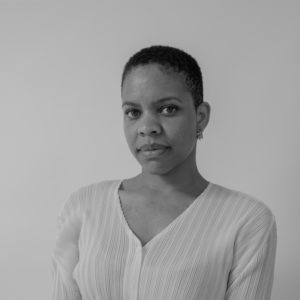
Vanessa Onwuemezi was shortlisted for her collection, Dark Neighbourhood. She is a writer and poet based in London, UK. She completed an MA in Creative Writing at the University of Birkbeck, 2018. Her story At the Heart of Things won the The White Review Short Story Prize 2019. She was a Showcase writer featured by the Literary Consultancy, UK, 2018, and has received a commendation for her flash fiction, The Crossing, from Bare Fiction magazine, 2017.
For you, what is the most difficult aspect of writing?
There’s a lot that’s difficult! But I think the most difficult thing is when it comes to editing. Being able to really see your own work the way a reader would see it, in order to edit it, is near impossible straight after you’ve finished writing something, you’re reliant on the passage of time, and good friends, to tell you the truth.
There is an assumption that the first story in a collection should be the strongest or the most accessible/entertaining, that it should act as a hook. What are your thoughts on this?
It makes sense to a certain extent. If you think about how many people might pick your book up in a shop and read the first paragraph or so, and on that decide whether they want to read the rest, then it would help to put your best foot forward. But it’s not worth overthinking it, if there’s an order that’s really important to you as a writer then you should do that. It’s hard to tell what someone might think is the ‘best’ story in a collection, it differs from person to person. I think each story in Dark Neighbourhood has been named the ‘favourite’ of someone, which is lucky. I ordered my collection partly in terms of length of the stories, the linkages between them, but overall there’s a kind of spiritual progression to the whole collection, so I put it in that order and hoped for the best.
Out of all the characters in your collection, which one would you like to spend more time with and why?
Definitely Noda, from the story Cuba she exudes charisma, strength and comforting warmth.
If you had to write a manifesto for writing short stories, what would be your first declaration?
‘Learn to write by writing.’ There’s no failsafe technique, you just have to dive in.
In terms of description, how do you decide what to put in and what to leave out?
Trial and error. You put things in, you read over it and experience teaches you what is too much and what you can afford to leave out. You only really know what works until someone reads it and seems to understand where the story is going and what you’re trying to do. Then you know that you’re on the right track, or you know that you can be more daring and take even more out, or add more in depending on your style.
After finishing a story, how do you feel? Do you celebrate?
It often never feels finished to be honest, I don’t know that I ever celebrate finishing a story. Perhaps I should! Mine would probably be a Negroni or a Boulvardier, next time I’ll do that.
